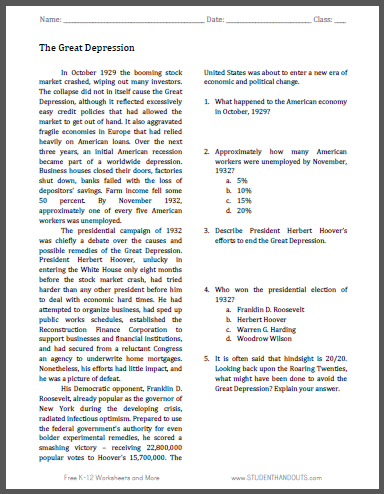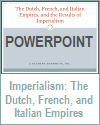| Great Depression Reading with Questions |
|---|
| www.studenthandouts.com ↣ American History ↣ American History Readings |
In October 1929 the booming stock market crashed, wiping out many investors. The collapse did not in itself cause the Great Depression, although it reflected excessively easy credit policies that had allowed the market to get out of hand. It also aggravated fragile economies in Europe that had relied heavily on American loans. Over the next three years, an initial American recession became part of a worldwide depression. Business houses closed their doors, factories shut down, banks failed with the loss of depositors' savings. Farm income fell some 50 percent. By November 1932, approximately one of every five American workers was unemployed. The presidential campaign of 1932 was chiefly a debate over the causes and possible remedies of the Great Depression. President Herbert Hoover, unlucky in entering the White House only eight months before the stock market crash, had tried harder than any other president before him to deal with economic hard times. He had attempted to organize business, had sped up public works schedules, established the Reconstruction Finance Corporation to support businesses and financial institutions, and had secured from a reluctant Congress an agency to underwrite home mortgages. Nonetheless, his efforts had little impact, and he was a picture of defeat.
The presidential campaign of 1932 was chiefly a debate over the causes and possible remedies of the Great Depression. President Herbert Hoover, unlucky in entering the White House only eight months before the stock market crash, had tried harder than any other president before him to deal with economic hard times. He had attempted to organize business, had sped up public works schedules, established the Reconstruction Finance Corporation to support businesses and financial institutions, and had secured from a reluctant Congress an agency to underwrite home mortgages. Nonetheless, his efforts had little impact, and he was a picture of defeat.His Democratic opponent, Franklin D. Roosevelt, already popular as the governor of New York during the developing crisis, radiated infectious optimism. Prepared to use the federal government's authority for even bolder experimental remedies, he scored a smashing victory—receiving 22,800,000 popular votes to Hoover's 15,700,000. The United States was about to enter a new era of economic and political change. Questions with answers in bold: 1. What happened to the American economy in October, 1929? The booming stock market crashed, wiping out many investors. 2. Approximately how many American workers were unemployed by November, 1932? a. 5% b. 10% c. 15% d. 20% 3. Describe President Herbert Hoover's efforts to end the Great Depression. He attempted to organize business, sped up work schedules, established the Reconstruction Finance Corporation to support businesses and financial institutions, and secured from a reluctant Congress an agency to underwrite home mortgages. 4. Who won the presidential election of 1932? a. Franklin D. Roosevelt b. Herbert Hoover c. Warren G. Harding d. Woodrow Wilson 5. It is often said that hindsight is 20/20. Looking back upon the Roaring Twenties, what might have been done to avoid the Great Depression? Explain your answer. Answers will vary. Click here to print this worksheet. |
 |  |  |  |  |  |
| www.studenthandouts.com ↣ American History ↣ American History Readings |








